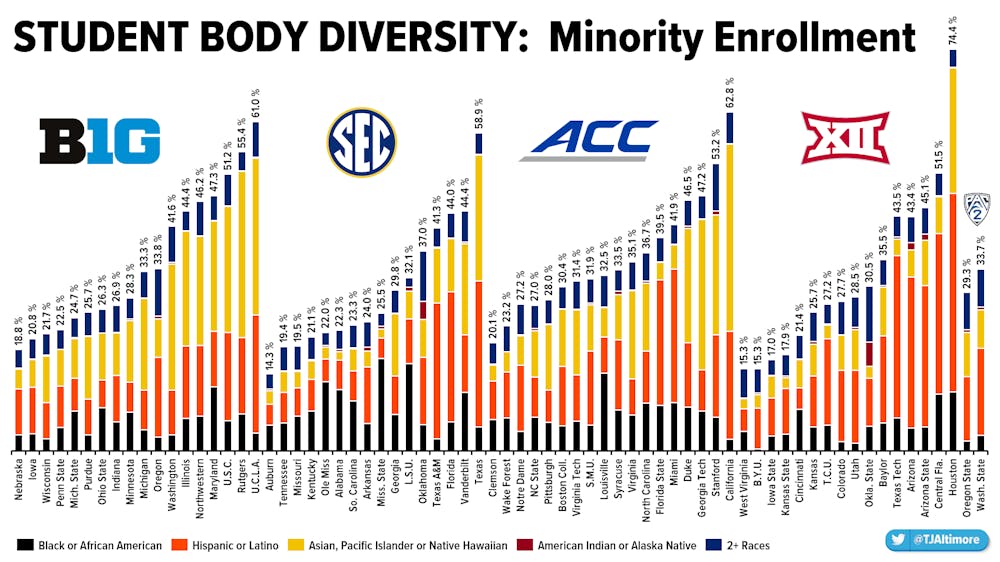Over one month since AL legislation passed the “DEI bill” on March 20, there is still an abundance of uncertainty in the university’s next steps to abide by the legislation going into effect on Oct. 1.
SB-129, is bringing Auburn backwards in advancement of diversity, and the unanswered questions and implications coming from this legislation are concerning.
The bill is a brief nine pages long and vague. The bill frequently mentions “divisive concepts” and defines them using eight examples of “divisive” ideas. These examples have sparked confusion with the general public and caused many to have different ideas of what a “divisive concept” really is.
The synopsis section of the bill states, “This bill would authorize certain public entities to discipline or terminate employees or contractors who violate this act.”
A possible implication of this bill could be professors changing their curriculums out of caution, to avoid termination. These changes might be due to the chilling effect the bill causes.
The chilling effect in the context of legislation is when groups or individuals do not engage in expressing their opinions because they fear prosecution or retaliation.
This synopsis section also states, “This bill would prohibit certain public entities, including state agencies, local boards of education, and public institutions of higher education, from maintaining a diversity, equity, and inclusion office or department or sponsoring any diversity, equity, and inclusion program or program that advocates for a divisive concept.”
Most likely, the effect of this is the closing of Auburn’s Office of Inclusion and Diversity (OID). Ironically, this step back comes just after the 60 year anniversary of Auburn’s integration and 40 years after the founding of the Black Student Union. It is notable to mention that clubs and organizations such as BSU or the society of women engineers will likely not be affected since they’re protected under the first amendment.
The founding of the OID, BSU and the integration of Auburn was a step toward a university where all students, regardless of their race, ethnicity or background could feel safe. Stripping away this amenity for students, appears malicious from the legislators that passed the bill.
Closing the OID office will also leave students of color without a sense of safety or a place where people understand and support them. In this office, students are surrounded by allies who understand them emotionally. Dismantling it would take away a safe space for students of color.
Why are the Alabama legislators intent on closing these offices? Why is it so important to them to remove these spaces from our college campuses?
The closure of this office walks the line of the fourteenth amendment, the equal protection clause. This office has never had a curriculum or taught a lesson. At its core, it’s a space for all students, regardless of race, to work and relax.
We also know that students of color rarely see people that look like them outside of some university employees or athletes, which increases feelings of alienation among non-white students.
It is also notable to state that Auburn is the least diverse SEC school, compared to Texas, whose state legislators also approved their own DEI bill.

A study done on diversity across major universities. Contributed by Tony Altimore.
This statistic and the bill going into effect could deter students of color from pursuing further education at Auburn.
We’ve come to the conclusion that we don’t know where to get these answers, especially if Auburn’s faculty is being vague as well.
It seems like even Auburn's leadership doesn't know where they stand. While President Christopher Roberts has been supportive overall of DEI efforts, the day the bill was passed he claimed the university will follow the legislation, “no matter what is passed.” Roberts failed to give any clarity to the student body on what the university's next steps would be and made no promises to find ways to support minorities under the new law. His joint statement with the Provost led to uncertainty among students and faculty alike.
We encourage students to read this bill and decide what message the enactment of this legislation would send to current and future students.
If the “Loveliest Village on the Plains” is among the happiest students in the nation, what will the effects of this bill be? If the university is so committed to “appreciating diversity as a strength” what steps will they take to back that up?
Do you like this story? The Plainsman doesn't accept money from tuition or student fees, and we don't charge a subscription fee. But you can donate to support The Plainsman.

Brychelle Brooks, senior majoring in public and professional writing with a minor in information systems, has been with The Auburn Plainsman since August 2023. She previously served as the Campus Reporter, Opinion Editor and Newsletter Editor. She is currently serving as the Editor-in-Chief.





